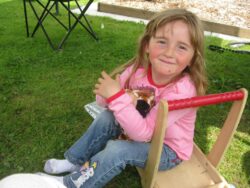April Jones’s tragic disappearance rocked a small Welsh market town (Picture: Channel 4)
I consider myself reasonably well travelled but I’m embarrassed to say I had never been to Wales – and had certainly never heard of the market town of Machynlleth – before I started working on a Channel 4 documentary about a terrible murder that had happened there.
The initial idea for the three part box set series, called The Disappearance of April Jones, was conceived by Blast! Films’ founder and Executive Producer, Ed Coulthard. A Welshman from Swansea, this story was particularly close to his heart.
He, unlike me, was acutely aware of how much the picturesque market town of Machynlleth in rural mid-Wales had been devastated by the grotesque murder of an innocent five-year-old child a decade ago by one of their own, a man called Mark Bridger who lived and worked there – and knew April Jones.
It became the longest search for a missing person in police history and it was a huge challenge for the police to secure a conviction without a body being ever found.
TV dramas, books, podcasts and documentaries about true crime have never been more popular because people are endlessly fascinated by the darker side of the human psyche. But what made this story different was how it had such a profound effect, not just on April’s family, but on her whole community.
Overnight, the people of Machynlleth had to grapple with the growing realisation that they had been harbouring a murderer in their midst, while facing the glare of the world’s media.
The risk with making true crime documentaries is that, while they offer viewers the potential to become arm chair sleuths solving a macabre puzzle, there is no doubt they also have the potential to be exploitative and voyeuristic. So, before we began, we had to make sure it was a project that would be approved of by April’s family.
The picturesque town of Machynlleth was rocked by April’s disappearance (Picture: Channel 4)
When the little girl’s mum Coral and her sister Jazz first agreed to meet us they were understandably wary. But when we explained that we wanted to put their voices, and those of their community at the heart of the series, they started to become more interested. They recognised we were trying to do something different that would delve much deeper than the police procedural investigation, while also feeling that the human story behind this despicable crime had never been properly told.
Gaining Coral and Jazz’s trust involved slowly getting to know them as individuals in their own right, and not just as a victim’s family.
In the immediate aftermath of April’s disappearance, her mum had developed a difficult relationship with the media because she felt so under siege from them and that had manifested itself into a more general anxiety about meeting new people. We had to be patient and create a safe space in our house that she could become familiar with.
Another challenge we had to overcome was that Coral couldn’t bear to be in the presence of a particular type of fireplace because, during the murder investigation into Mark Bridger, the police discovered human bone fragments in the log burner at his house in which they believe he had attempted to dispose of April’s remains. We were very mindful of that and, as the time approached to interview Coral, we spent a lot of time sourcing a location she would feel comfortable with.
The people of Machynlleth had to grapple with the growing realisation that April was killed by one of their own (Picture: Channel 4)
April’s murder devastated her family, and the community she had grown up in (Picture: Channel 4)
April’s murder is now being explored in a Channel 4 documentary (Picture: Channel 4)
Although April’s murder had affected both her mum and sister profoundly, we quickly began to realise that they were two incredibly strong and independent women who not only found the strength of character to survive and overcome this horrendous tragedy, but offered real insight into why it impacted so many people locally, nationally and internationally.
Beyond their years of pain and suffering, we got to know them as two funny, feisty women who we now count as friends. I took it as a real compliment that Coral allowed me to do her hair and and make up before we interviewed her for the series. And in Jazz, we found an inspirational young woman who holds down two jobs and runs a craft business in her spare time.
To view this video please enable JavaScript, and consider upgrading to a web
browser that
supports HTML5
video
Beyond the impact on the family, we were really interested in how this crime had affected the community at large, especially because the murderer Mark Bridger lived amongst them and was well known to everyone.
To get local people on board the only real option was to go and live in Machynlleth to build everyone’s trust and try to understand the impact of an unspeakable crime had rippled out to effect everyone. Ed teamed me up with Welsh producer Carys Laws and BAFTA winning Series Director James Incledon, whose was keen to establish an original look and style for this series as he had done on other Blast series like Reported Missing and Forensics: The Real CSI. We were also lucky to be joined by Production Manager Nancy Rushforth who understood all the complexities of embedding a documentary team in a small town.
The team behind the documentary worked hard to build a trustful and strong relationship with Coral, April’s mum (Picture: Channel 4)
Jazz, April’s sister, also discusses how the loss of April shaped her life (Picture: Supplied)
The first thing we discovered when we moved to Machynlleth is that the town really is unusual. Recently described by a broadsheet as a place that ‘could almost double for New York’s Greenwich Village,’ Machynlleth is an artsy hub that is home to three distinct groups of people – locals, blow-ins and a hippy-type alternative community who, we were told, had its origins in the Centre for Alternative Technology, a local eco centre set up in the 1970s.
Over the months as we got to know Coral and Jazz and their community, we also began to appreciate how important Welsh identity is in this part of the world. Although I had never visited the country before, coming from Northern Ireland I know all about the importance of national identity.
Machynlleth promotes itself as the ancient capital of Wales, and our team discovered that April’s mum Coral speaks for many who are fiercely proud of their Welsh heritage. She says in the series she was determined not to have an English baby after April was born prematurely and was in danger of being transferred to a hospital in Liverpool for urgent care. A shared sense of the importance of identity helped build common ground between us.
But although we spent months building trust, we understood that not everyone was keen to talk about April’s murder or indeed wanted the story to be made into a documentary series.
The series also looks at the people who brought April’s murderer to justice, such as Andy John, Senior Investigating Officer at Dyfed-Powys Police (Picture: Channel 4)
Iwan Jenkins also describes the case the Crown Prosecution Service Cymru-Wales brought (Credit: Channel 4)
For a long time, many felt her disappearance was the only story in town and some were worried that Machynlleth had become too synonymous with ‘dark tourism’ – ten years on, outsiders still make a pilgrimage there to gawp at the scene of April’s abduction.
We also discovered that many people were so disgusted when Mark Bridger was convicted of her murder, they refuse to speak his name. As well as wanting to tell this story more thoroughly than it has ever been told before, we were determined that our series would set out to reclaim Machynlleth as the utterly beautiful oasis it was known as before April’s murder.
With so many books, films, podcasts and documentaries already out there, it’s clear to see that true crime is a crowded genre – trying to make something different really challenged our story-telling skills.
The murder of a child is as dark as it gets and in the edit we had to work hard not to overwhelm the viewer. Key for us was to keep returning to the family and community’s perspective on April’s disappearance and subsequent murder investigation and our Series Editor Joe John and team of editors – Jane Hodge, Myles Richardson and Katherine Lee – worked really hard to help us convey how, through the darkness, there were so many glimmers of light.
After living among this inspirational community for nearly six months, I now refer to Machynlleth as ‘Mach,’ lovingly and with pride, as the locals do.
More: TV
I’m also thankful too that those who bravely chose to share their story with us are delighted with how we have portrayed on screen the town they love so well.
Beyond the devastating impact of one little girl’s murder is a story of neighbours, friends and a community coming together to support each other and heal.
The phrase ‘triumph over adversity’ is so oft used it has become a cliché – but April’s family and the people of Machynlleth are living, breathing proof that resilience can help the human spirit repair and renew.
The Disappearance of April Jones airs Monday at 9pm on Channel 4.
Do you have a story you’d like to share? Get in touch by emailing [email protected]
Share your views in the comments below.
MORE : True crime fans are all calling this secret Netflix hack a total ‘game-changer’
MORE : From chickens to candles… how Meghan and Harry’s story has shifted in their bombshell documentary
Gaining Coral and Jazz’s trust involved getting to know them in their own right – not just as a victim’s family.





